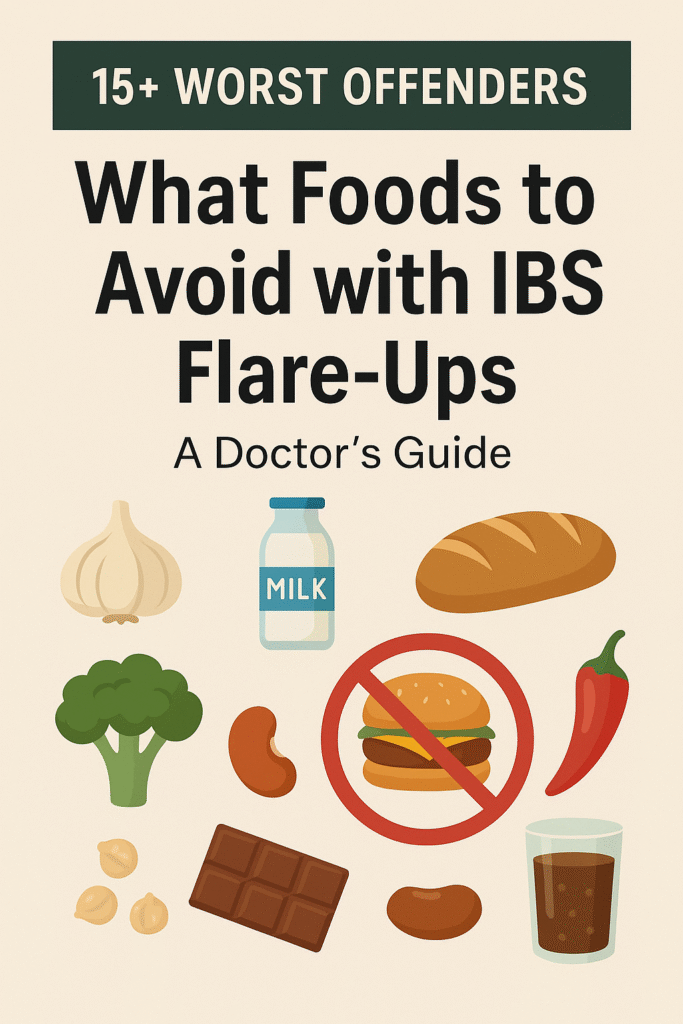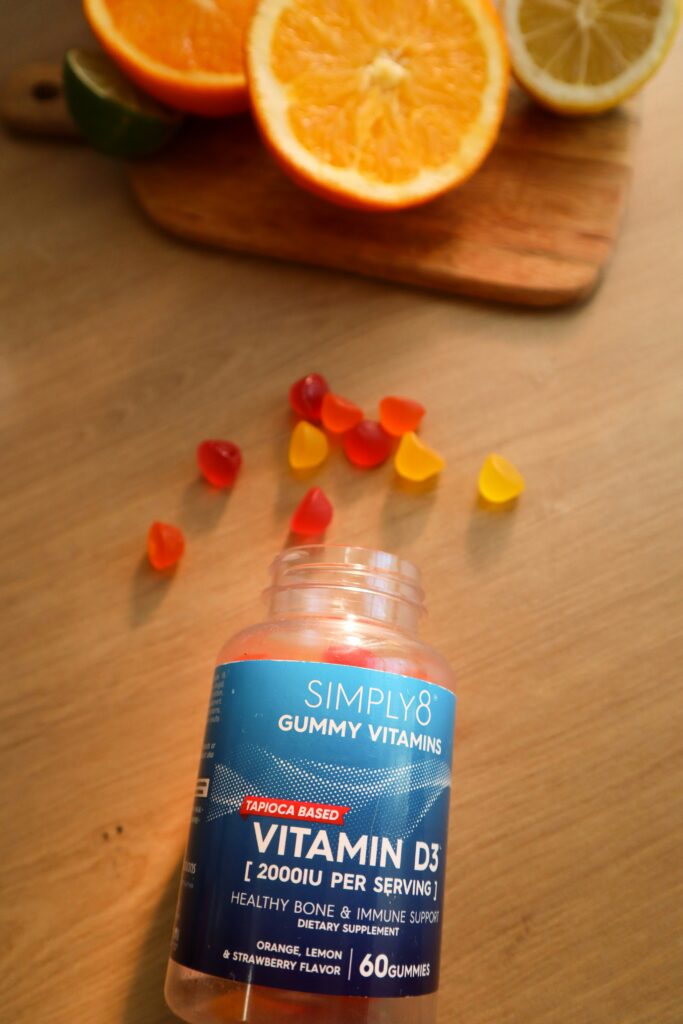
⚠️ Affiliate Disclaimer: This post may contain affiliate links, which means I may earn a small commission — at no extra cost to you — if you make a purchase through one of these links. I only recommend products or services I genuinely trust and believe can provide value. Thank you for supporting My Medical Muse!
15+ Worst Offenders: What Foods to Avoid with IBS Flare-Ups
What Foods to Avoid with IBS Flare-Ups: A Doctor’s Guide
Your go-to list of trigger foods and smarter swaps to help calm your gut. Living with Irritable Bowel Syndrome (IBS) can feel like walking through a food minefield, one wrong bite and your stomach revolts, bloating, cramping, diarrhea, or constipation (or all of them at once). Managing IBS doesn’t have to be a guessing game, as a doctor with firsthand experience in digestive health, I’ve seen how avoiding certain foods can dramatically improve symptoms. This in-depth post is science-backed, practical advice on the foods to avoid during flare-ups and what you can eat instead.
Table of Contents:
- 1. What Is an IBS Flare-Up?
- 2. High FODMAP Foods
- 3. Dairy Products
- 4. Gluten-Containing Grains
- 5. Cruciferous Vegetables
- 6. Legumes and Pulses
- 7. Fatty, Fried, and Greasy Foods
- 8. Spicy Foods
- 9. Caffeinated Beverages
- 10. Alcohol
- 11. Carbonated Drinks
- 12. Artificial Sweeteners
- 13. Chocolate
- 14. Processed Foods
- 15. Too Much Fiber at Once
- 16. Cold Foods and Drinks
- Bonus: Soothing Foods During Flare-Ups
- IBS Food Triggers Are Personal
- When to See a Doctor
- Final Thoughts
What Is an IBS Flare-Up?
An IBS flare-up is a period when your symptoms worsen often triggered by stress, hormonal changes, or certain foods. These episodes can last for hours or days and may include:
- Abdominal pain or cramping
- Bloating and gas
- Diarrhea (IBS-D), constipation (IBS-C), or alternating (IBS-M)
- Urgency or incomplete evacuation.
- Mucus in stool
While IBS is a chronic condition, many people find lasting relief by adjusting their diet especially during flare-ups.
Also Read : Everything You Need To Know About IBS
Top 15 Foods to Avoid During an IBS Flare-Up
Below are the biggest dietary culprits, especially for those with IBS-D (diarrhea-predominant) or IBS-M (mixed type). Some can even worsen constipation in IBS-C.
High FODMAP Foods
FODMAPs (Fermentable Oligo-, Di-, Mono-saccharides And Polyols) are short-chain carbohydrates that are poorly absorbed in the small intestine. They ferment in the gut, producing gas, bloating, and diarrhea.
Common High FODMAP offenders:
- Garlic and onions
- Wheat, rye, and barley (in large amounts)
- Apples, pears, and stone fruits
- Beans, lentils, chickpeas
- Milk, yogurt (lactose-containing)
- Sweeteners like sorbitol, xylitol
Opt for low-FODMAP alternatives like carrots, zucchini, blueberries, oats, lactose-free dairy, and sourdough bread.
Dairy Products:
Lactose intolerance and IBS often go hand in hand. During flare-ups, lactose-containing foods can worsen bloating, cramping, and diarrhea.
Avoid: Milk (cow, goat, sheep), soft cheeses (brie, cream cheese), ice cream, milk chocolate.
Swap For: Lactose-free milk or almond, rice, oat, or coconut milk, hard cheeses (cheddar, parmesan), coconut yogurt or lactose-free yogurt.
Gluten-Containing Grains:
Even if you’re not celiac, gluten and the fructans found in wheat can irritate the gut during an IBS flare. Avoid eating bread, pasta, cereal, crackers and baked goods, Instead, eat gluten-free bread, quinoa, oats (certified GF), rice, corn tortillas.
Cruciferous Vegetables:
These veggies are nutrient-rich but high in insoluble fiber and sulfur, which causes gas and bloating. Avoid eating broccoli, cabbage, cauliflower, brussels sprouts. Instead swap it for zucchini, carrots, spinach, eggplant (cooked).
Legumes and Pulses:
Beans are notoriously hard to digest due to their fiber and oligosaccharides. Avoid eating lentils, black beans, chickpeas, kidney beans. Swap for canned, rinsed lentils in small amounts (low-FODMAP), firm tofu, edamame (in moderation).
Fatty, Fried, and Greasy Foods:
These foods slow digestion and can trigger cramping or diarrhea. Avoid eating french fries, fried chicken, pizza, bacon and sausage. Eat grilled or baked protein, steamed vegetables, air-fried or oven-roasted options instead.
Spicy Foods:
Chili peppers contain capsaicin, which can irritate the GI lining and increase motility leading to urgency and pain.
- Avoid: hot sauce, chili, spicy curry, jalapenos.
- Swap For: Herbs (like basil, thyme, turmeric), ginger or cinnamon for gentle flavor.
Caffeinated Beverages:
Caffeine stimulates your colon and can worsen diarrhea and urgency.
- Avoid: coffee, energy drinks, strong black tea.
- Swap For: Herbal teas (peppermint, chamomile), decaf coffee (try Swiss-water processed), warm lemon water.
Alcohol:
Alcohol is a gut irritant that disrupts your microbiome and may increase motility.
- Avoid: Beer (high in gluten and FODMAPs), wine (especially sweet varieties), spirits with sugary mixers.
- Swap For: Alcohol-free gin and tonic, kombucha (low FODMAP versions), sparkling water with citrus.
Carbonated Drinks:
The bubbles in fizzy drinks can trap air in your gut, worsening bloating and pain.
Avoid: Soda, sparkling water, beer.
Swap For: Still water, herbal iced teas, ginger or peppermint-infused water.
Artificial Sweeteners:
Especially sorbitol, mannitol, xylitol, and maltitol, found in “sugar-free” products, gums, mints, and diet foods.
- Avoid: Sugar-free candy, protein bars with sugar alcohols, diet drinks.
- Swap For: Maple syrup, small amounts of stevia, raw honey (in moderation).
Chocolate:
Chocolate combines caffeine, fat, and sometimes lactose, a triple threat during flare-ups.
- Avoid: Milk chocolate bars, chocolate milk, chocolate cake.
- Swap For: Carob, cocoa nibs (in small amounts), dairy-free dark chocolate.
Processed Foods:
Packaged foods often hide FODMAPs, preservatives, and emulsifiers that irritate the gut. Avoid eating microwaved meals, instant noodles, flavored chips, and cold cuts. Instead eat fresh, whole foods, homemade snacks (e.g., baked sweet potato slices), rice cakes or low-FODMAP crackers.
Too Much Fiber at Once:
Fiber is essential, but a sudden increase (especially insoluble fiber) can worsen gas and cramping. Avoid: Raw vegetables, bran flakes, large salads.
Swap For: Soluble fiber (oats, bananas, chia seeds), cooked vegetables, psyllium husk (for constipation-predominant IBS).
Cold Foods and Drinks:
Ice-cold beverages can shock the digestive tract and trigger spasms. Avoid taking iced drinks, cold smoothies, ice cream. Swap this for room temperature or warm drinks, warm broth-based soups, smoothies made with warm water or allowed to sit a few minutes
Foods That May Soothe During Flare-Ups
While this post is mostly about what to avoid, here are gentle, gut-friendly foods that often help:
- White rice and oats: Easy on digestion.
- Bananas and blueberries: Low FODMAP fruits.
- Boiled potatoes and carrots: Soft, soluble fibers.
- Bone broth: Soothing and mineral-rich.
- Peppermint tea: relieves cramping.
- Ginger tea: Reduces nausea and bloating.
IBS Food Triggers Are Personal
Every gut is unique, what triggers a flare in one person may be harmless to another. Consider keeping an IBS food diary to track:
- What you ate
- When symptoms started
- Stool changes (use the Bristol Stool Chart)
This helps pinpoint your personal triggers and tailor your diet long-term.
When to See a Doctor
Not every digestive symptom is IBS. Speak to a healthcare provider if you notice:
- Unexplained weight loss
- Blood in stool
- Nighttime symptoms
- New symptoms after age 50
- Family history of colon cancer, celiac, or IBD
These could signal more serious conditions like celiac disease, inflammatory bowel disease, or colon cancer.
Final Thoughts:
Managing IBS starts with knowledge, and food is one of the most powerful tools. Avoiding these 15 trigger foods during flare-ups can make a massive difference in your comfort and quality of life. Remember, food isn’t the enemy, your body just needs the right kind of fuel.
👩⚕️ Need Personalized Health Advice?
Get expert guidance tailored to your unique health concerns through MuseCare Consult. Our licensed doctors are here to help you understand your symptoms, medications, and lab results—confidentially and affordably.
👉 Book a MuseCare Consult Now

